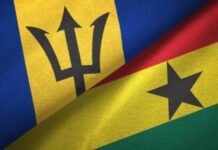
- Country only under enhanced vigilance
Ambassador Diana Acconcia, Head of European Union Delegation to Ghana, has clarified issues regarding the blacklisting of the country due to significant deficiencies in Anti-Money Laundering and Combating Financing of Terrorist (AML/CFT) regimes, saying, there are no consequential restrictions or bans imposed on government or any company in Ghana.
The European Union (EU) in May 2020 placed Ghana on the list of countries that is seen as posing significant threat to the financial system of the Union after it failed to meet some requirements earlier in the year. But due to the global pandemic, the union suspended enforcement of the list but has confirmed it has entered into full force beginning October 1, 2020.
Following this, there were reports that EU has placed restrictions and/or bans on certain government or private transactions with the Union as one of the consequences that comes with being on the list.
However, in an exclusive interview with the B&FT, Ambassador Acconcia clarified misconceptions surrounding the issue, saying the country made it to the list because it had already been classified by the Financial Action Task Force (FATF) as among Jurisdictions Under Increased Monitoring, otherwise known ‘grey list’, which essentially alerts financial institutions in the EU to conduct more due diligence on companies coming from countries on that list.
“Ghana was indeed placed on the list of high-risk countries by the European Union in May but has entered into force this October. What that simply means is that Ghana is not doing enough to fight against money laundering and terrorist financing. Ghana is on this list because it has been put on a similar list by Financial Action Task Force (FATF), an inter-governmental body that sets the global standards for the fight against money laundering, terrorist financing etc.
The European Union has decided that whichever country is on the list of FATF is also high risk. So Ghana will be taken off the list if FATF also takes it off its list. The consequence of being on this list is that financial institutions in Europe will be obliged to apply what is called enhanced vigilance on the customers from Ghana.
They will have to carry out more due diligence on transactions that are presented by these clients. So there is no ban and there is no decision to close Ghanaian accounts in Europe. The only obligation that is enhanced surveillance on the accounts of entities coming from countries on this list,” she said.
She further emphasised that the list does not imply that any company in the country has yet been found complicit in anti-money laundering scheme and that Ghana can come off the list soon if concerns raised by the FATF which include strengthening of the financial intelligence system, operationalising the beneficial ownership register, and enhancing the supervision of the activities of NGOs to prevent them from fronting for illegal organisations, among others, are addressed promptly.
“I must be clear that the European Union has not found evidence of money laundering from entities from Ghana. There is nothing of that sort. Basically, Ghana has to strengthen its financial intelligence and financial surveillance system. Ghana has put in place institutions to do that, such as the Financial Intelligence Centre.
Another issue that has been flagged is the transparency in the beneficial ownership of entities. Ghana has established beneficial ownership register and is left with facilitating access to it. Another point of concern was on non-profit organisations which sometimes are used as a cover for financing illegal activities.
The moment a country is put on the list, FATF has an action programme that it goes through with the country and then reviews it periodically to decide whether the country should be taken off that list or not. So the next review will be at the end of this year,” she said.
According to information published on the website of FATF, the country has made some progress in its AML/CFT regime but should work hard in: implementing a comprehensive national AML/CFT Policy based on the risks identified in the National Risk Assessment (NRA), including measures to mitigate ML/TF risks associated with the legal persons; and improving risk-based supervision, by enhancing the capacity of the regulators and the awareness of the private sector.
The rest include ensuring the timely access to adequate, accurate and current basic and beneficial ownership information; ensuring that the Financial Intelligence Centre is focusing its activities on the risks identified in the NRA and adequately resourced; and applying a risk-based approach for monitoring non-profit organisations.
B&FT
























